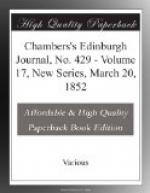Under this title has lately been produced a novelty in our literature, the memoirs of an eminent commercial man.[2] Samuel Budgett died in May 1851, at the age of fifty-seven. Though starting in life without capital or credit, he had, by the sheer exercise of his own innate qualities, risen to the head of one of the most colossal concerns in England. Had he been merely a clever bargainer, and a skilful organiser of business arrangements, there might have been some value in his memoirs, as a guidance to young mercantile aspirants; but Budgett was something more than all this, and his biography serves the far higher purpose of shewing how a man may be at once a most adroit merchandiser, and a man of liberal practice, and a true lover of his kind. Let it not be supposed that he was a soft man, who had prospered through some lucky accident. He really was a thorough-paced follower of the maxim which recommends buying in the cheapest and selling in the dearest market: he was reputed as keen in business. But he was also kind-hearted and high-principled, and it is this union of remarkable qualities which gives his memoirs their best value.
Mr Budgett was a general provision-merchant at Bristol, with also a large warehouse at Kingswood Hill, where his private residence was. His biographer presents him as he came daily into town to attend to business. ’You might have often seen driving into Bristol, a man under the middle size, verging towards sixty, wrapped up in a coat of deep olive, with gray hair, an open countenance, a quick brown eye, and an air less expressive of polish than of push. He drives a phaeton, with a first-rate horse, at full speed. He looks as if he had work to do, and had the art of doing it. On the way, he overtakes a woman carrying a bundle. In an instant, the horse is reined up by her side, and a voice of contagious promptitude tells her to put up her bundle and mount. The voice communicates to the astonished pedestrian its own energy. She is forthwith seated, and away dashes the phaeton. In a few minutes, the stranger is deposited in Bristol, with the present of some pretty little book, and the phaeton hastes on to Nelson Street. There it turns into the archway of an immense warehouse. “Here, boy; take my horse, take my horse!” It is the voice of the head of the firm. The boy flies. The master passes through the offices as if he had three days’ work to do. Yet his eye notes everything. He reaches his private office. He takes from his pocket a memorandum-book, on which he has set down, in order, the duties of the day. A boy waits at the door. He glances at his book, and orders the boy to call a clerk. The clerk is there promptly, and receives his instructions in a moment. “Now, what is the next thing?” asks the master, glancing at his memorandum. Again the boy is on the wing, and another clerk appears. He is soon dismissed. “Now, what is the next thing?” again looking at the memorandum. At the call of the messenger, a young man now approaches the office door. He is a “traveller;” but notwithstanding the habitual push and self-possession of his class, he evidently is approaching his employer with reluctance and embarrassment. He almost pauses at the entrance. And now that he is face to face with the strict man of business, he feels much confused.




